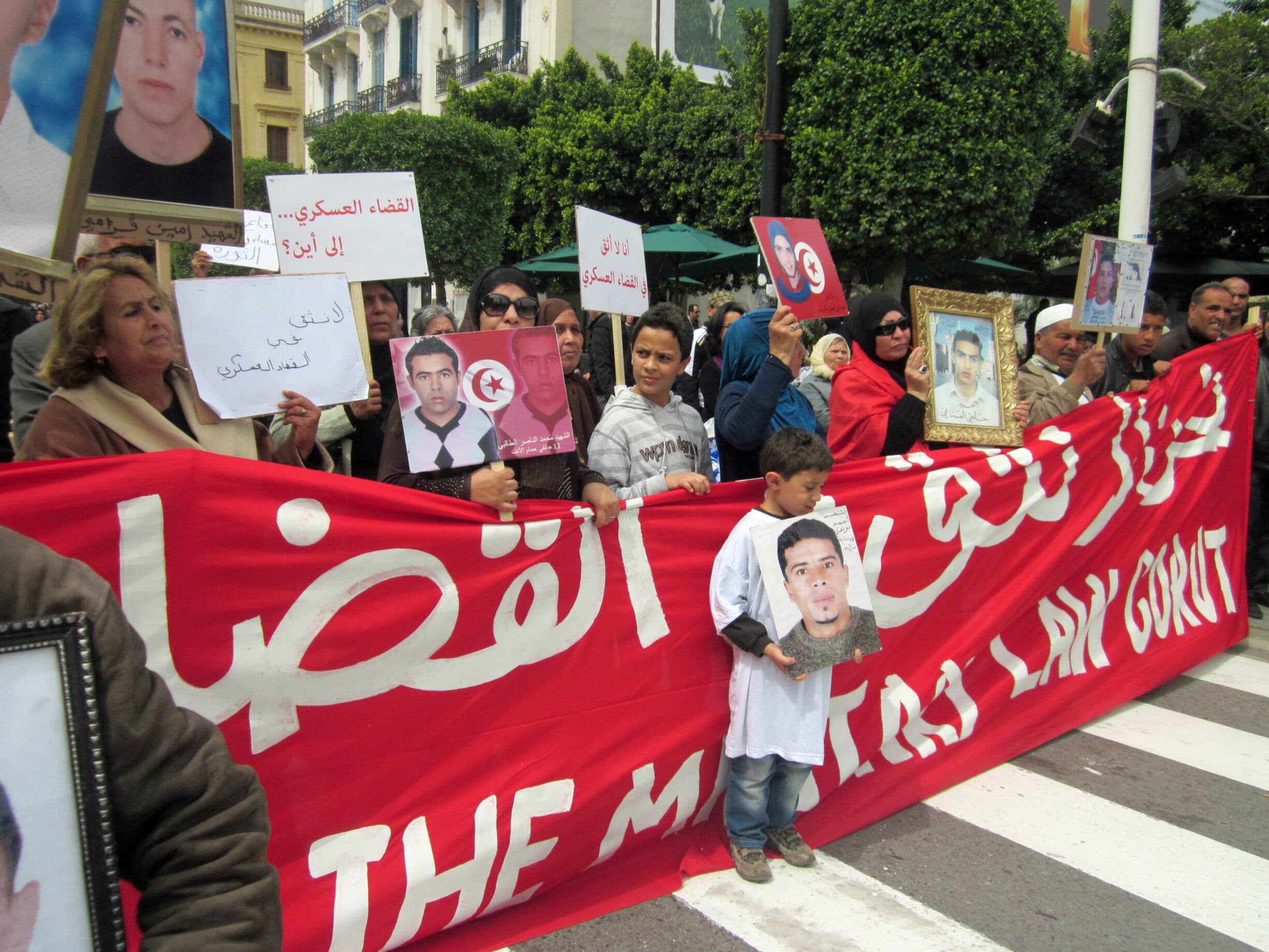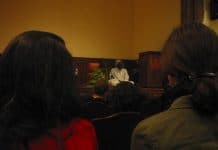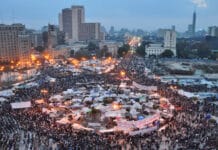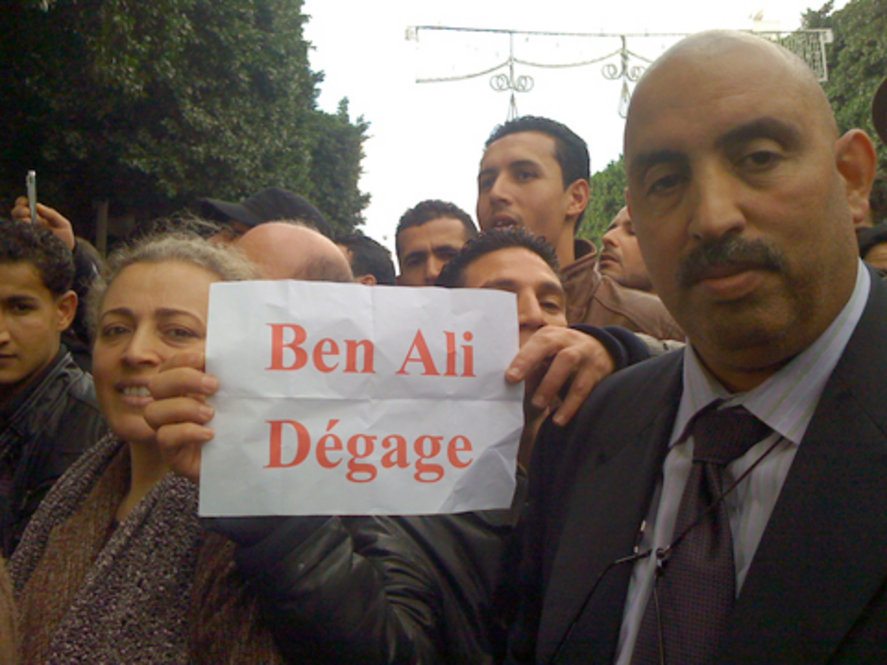
Jasminrevolutionen blev det kaldt i de vestlige medier. Det startede i midten af december 2010, da tuneseren Mohamed Bouazizi begik selvmord ved at antænde benzin, han havde hældt ud over sig selv. Baggrunden var, at han ikke kunne finde arbejde, og når han forsøgte sig som gadesælger, blev han stoppet korporligt af politiet. Derpå fulgte massive demonstrationer, der endte med, at præsident Zine El Abidine Ben Ali måtte flygte til Saudi Arabien. Med det indledtes en række oprør og protester i en række arabiske lande, der blev kaldt det arabiske forår.
Socialistisk Bibliotek, påbegyndt januar 2011, revideret januar 2021.
Indhold
Se også andre linkboxe på Socialistisk Bibliotek:
- Oprøret i Egypten om det folkelige oprør vendt mod Mubaraks regime.
- Opstanden i Libyen om det væbnede oprør mod Gaddafis regime.
- Yemen – Ungdommens revolution
- Det arabiske forår om oprørerne i Nordafrika og Mellemøsten foråret 2011.
Leksikale
- Mohamed Bouazizi (Wikpedia.org)
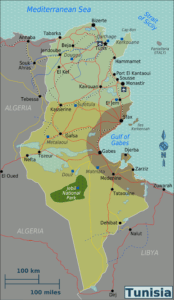
- Tunesien (Leksikon.org). Med links til meget statistik.
- Tunesien (Wikipedia.dk). Opdateret artikel med links til artiklerne på især engelsk og fransk, inkl. artikel om Jasminrevolutionen
- Tunisian Revolution (Wikipedia.org)
- Politics of Tunisia (Wikipedia.org)
- Tunisian General Labour Union (Wikipedia.org)
Sites
- Information.dk: Tunesien
- In Defence of Marxism: Tunisia
- International Viewpoint: Tunisia
- Jadaliyya: Tunisia
- Links: International Journal of Socialist Renewal: Tunisia
- Middle East Researh and Information Project: Tunisia
- Tunisia Solidarity Campaign (site)
Nyere artikler
Tunesien: Langt fra foråret. Af Joseph Daher (Socialistisk Information, 6. november 2021). “Den 25. juli 2021 afsatte Tunesiens præsident Kais Saied regeringen, opløste parlamentet og tildelte sig selv vidtstrakte beføjelser. Alle disse handlinger sætter spørgsmålstegn ved den demokratiske ramme og rettigheder, som blev opnået, da diktator Ben Ali blev sat fra magten i 2011.”
I Tunesien var islamisterne demokratisk valgt, men blev væltet af sekulære kræfter. Af Carsten Jensen (Solidaritet.dk, 10. oktober 2021). “… [i] Tunesien, hvor militæret pludselig har fået en aktiv politisk rolle. At den demokratisk valgte regering var islamistisk, kan være en del af forklaringen på, at den internationale reaktion på kuppet var behersket.”
Whatever happened to dignity? The politics of citizenship in post-revolution Tunisia. By Nadia Marzouki (Middle East Report, Issue 301, Winter 2021). “This time, near the end of 2021, the prospects for social justice and democracy in Tunisia are quite bleak. In the aftermath of President Kais Saied’s coup of July 25, 2021, the state of power relations among political parties and civil society organizations is uncertain.”
Mass protests shake Tunisia. By Andreas Nørgård (In Defense of Marxism, 25 January 2021)
“A new, powerful mass movement has erupted in Tunisia. The explosion of anger is due to the economic crisis, which has degraded the lives of Tunisians to a life of poverty and suffering.”
Tunisia in revolt—ten years on (Socialist Worker, Issue 2735, 13 December 2020)
“Ten years have passed since the start of the Tunisian revolution. Nick Clark explains how it toppled a dictator, encouraged more fightbacks, and shook the world.”
Mohamed Bouazizi: the spark that set the Middle East on fire (December 18, 2020)
“Shabbir Lakha remembers Mohamed Bouazizi and his protest that launched revolutions across the Middle East, in the first of a series of articles commemorating the 10th anniversary of the Arab Spring.”
Mohamed Bouazizi and Tunisia: 10 years on. By Habib Ayeb (ROAPE, December 17, 2020)
“This blogpost marks the 10th anniversary of the death of Mohamed Bouazizi, who on 17 December 2010 set himself alight at Sidi Bouzid in an act of self-immolation that made him the iconic martyr of the Tunisian revolution.”
Tunisia: presidential election, a blow to the parties of the “democratic transition”. By Jorge Martin (In Defence of Marxism, 20 September 2019)
“The results were a damning indictment of both the ‘secular’ and ‘Islamist’ bourgeois parties, which have jointly managed the country since 2011.”
Tunisia’s next revolution. By Ines Mahmoud (Jacobin, 17 February 2018)
“Young Tunisians, unwilling to abandon the revolution they launched seven years ago, are fighting against a government committed to neoliberal austerity.”
The fate of the revolution. By Nathan Legrand (Jacobin, 17 February 2018)
“Tunisia’s ruling class is pursuing the same economic policies as the authoritarian regime it replaced.”
“The promised economic miracle never happened” (International Viewpoint, 24 January 2018)
“For the specialist of the Arab world Gilbert Achcar, the Tunisian revolt was ‘foreseeable’. And it is a continuation of the uprisings of 2011.”
The evolution of Neoliberalism in Tunisia 1980-2017. By Edna Bonhomme (New Socialist, 24 January 2018)
“I argue that while neoliberalism has been a recent phenomenon in Tunisia (late 1980s), that neoliberal policies have been met with resistance and that labour movements and unions have been integral to that struggle.”

Danske artikler (+ norske)
Autonom Infoservice
Tunesiske feminister: ”Vi viger ikke tilbage …” – interview (7. januar 2012)
“Den 9. januar 2012 vil den tunesiske feminist Souad Rejeb fra Femmes Democrates modtage Simone de Beauvoir prisen i Paris.”
Storm over Tunesien (20. januar 2011)
“Det har ulmet længe i Tunesien. Vreden over fattigdom, umyndig- gørelse og statslig repression eksploderede den 17. december og er siden vokset til en folkeopstand. I løbet af de heftige konfrontationer med politiapparatet har de protest- erende udviklet spæde dobbelt- magtstrukturer i kvarterene og i virksomhederne.”
‘Opstanden i Tunesien er også en kamp for borgerrettigheder og værdighed’ (Autonom Infoservice, 12. januar 2011)
“I et interview med den kendte 58-årige oppositionelle aktivist og journalist Sihem Bensedrine forklarer hun baggrunden for den længe ulmende utilfredshed i befolkningen, som nu er eksploderet i åbent oprør.”
Information.dk
Hvordan en umulig alliance reddede Tunesien fra kollaps. Af Chris Stephen (Moderne Tider, 2. januar 2016).
“Efter Det Arabiske Forårs optimisme stod Tunesien i 2013 på randen af borgerkrig, men fire af landets civilsamfundsorganisationer genoprettede den demokratiske samtale – og vandt Nobels fredspris.”
Myten om den islamistiske vinter. Af Olivier Roy (4. januar 2013)
“Egypten og Tunesien er ikke ved synke ned i kaos og fundamentalisme – de er blot i gang med at lære sig selv at blive demokratier.”
Modkraft.dk
Oprør i Tunesien inspirerer arabiske befolkninger. Af Osama Hamza (25. januar 2011)
“Den folkelige mobilisering imod gamle regimestøtter fortsætter i Tunesien. Samtidig har 5.000 mennesker demonstreret i Yemen for »brød og frihed«. I Ægypten har enkelte forsøgt at sætte ild til sig selv. Mens politiet i Algeriet har slået hårdt på demonstrationer i flere byer.”
Le Monde Diplomatique
Noen ganger skjer det umulige. Av Serge Halimi (nr.2, februar 2011)
“En sekulær revolusjon er underveis i de arabiske landene. Men etter å ha snakket om demokrati og rettferdighet, er vestlige ledere nå plutselig bekymret.”
En verdighet ingen kan ta fra dem. Av Olivier Piot (nr.2, februar 2011)
“Undertrykking, mobilisering, represalier – en klassisk syklus. Hvordan seiret tunisierne?”
Sjokket i den arabiske verden. Av El Alaoui Hicham Ben Abdallah (nr.2, februar 2011)
“‘Den arabiske sjelen er knust av fattigdom og arbeidsledighet’, sa generalsekretæren for Den arabiske liga under toppmøtet i Sharm el-Sheikh 19. januar. Bedre kan ikke frykten til regionens ledere uttrykkes. Hvor stor innvirkning vil den vellykkede revolusjonen i Tunisia få på opprørerne i nabolandene?”
Revolution
Tunesien: fortsæt revolutionen indtil sejr. Af Jorge Martin (19. januar 2011)
“Ikke så snart Ben Ali var på et fly til Saudi Arabien den 14. januar, begyndte den tunesiske herskende klasse og dens imperialistiske dukkeførere at manøvrere for at kontrollere situationen.”
Tunesien og den arabiske revolutions fremtid. Af Alan Woods (18. januar 2011)
“I over en uge gennemgik Tunesien en revolution af episke dimensioner. Masseopstanden i Tunesien styrtede den forhadte diktator Ben Ali efter 23 år ved magten.”
Socialister.dk
Tunesiens revolution et år efter. Af Siân Ruddick (januar 2012)
“Interview med Mohamed Bani … Han tilbragte lang tid i Tunesien under revolutionen og har ofte været tilbage siden diktatoren Ben Ali faldt 14. januar 2011.
Tema: Tunesien
Links med artikler, Socialistisk Arbejderavis’s egne + en del engelske, også baggrundsartikler af bl.a. Richard Seymour.
Socialistisk Information
Grundlov: Stor demokratisk sejr i Tunesien. Af Benny Åsman (23. januar 2014)
“Ligestilling mellem kønnene, ret til faglig organisering, og strejkeret: Tre år efter diktatoren Ben Ali flygtede til Egypten har Tunesien fået ny grundlov, som er en stor sejr for den demokratiske opposition.”
Chokri Belaïd: Chokbølger i Tunesien. Af Åge Skovrind (10. februar 2013)
“Mordet på den venstreorienterede oppositionspolitiker Chokri Belaïd har udløst en omfattende proteststorm i Tunesien mod regeringen og mod den voksende vold fra islamistiske bander.”
‘Hvilken slags revolution?’ (28. september 2011)
“Hvad er situationen i Tunesien? Hvad er på spil? Hvad er hindringerne for en fortsættelse af den revolutionære proces? Alhem Belladj diskuterede disse spørgsmål i sit indlæg på NPA’s Sommeruniversitet i Port Leucate.”
Tunesien: Revolutionen forsætter. Af Vagn Rasmussen (28. januar 2011)
“I ugen efter Ben Alis fald fortsatte demonstrationerne for en opløsning af hans parti, RCD, og de bredte sig mere og mere og gik så langt, at de invaderede kontorerne for hans parti i hver eneste by i landet.”
Folkelig opstand mod Tunesiens diktatur og europæisk imperialisme (22. januar 2011)
“Tunesien gennemgår i disse uger en sand folkelig opstand … en massebevægelse, først blandt arbejdsløse. Dernæst arbejderne, som tvang selv den officielle fagbevægelse til at droppe støtten til regimet. Da vinterferien var slut tilsluttede gymnasieelever og studenter sig til.”
Solidaritet
Jetfly over Tahrir-pladsen. Af Hicham Safieddine (nr.1, februar 2011)
“Den revolutionære glød, der blev tændt med Mohammed Bouzizis selvmord i Tunesien i slutningen af december, er nu blevet til en regulær ildebrand af folkelige opstande over alt i den arabiske verden og bliver for hovedparten ført an af arbejdere, studenter og arbejdsløse (mænd som kvinder).” Se artiklen online på engelsk nedenfor under Socialist Project.
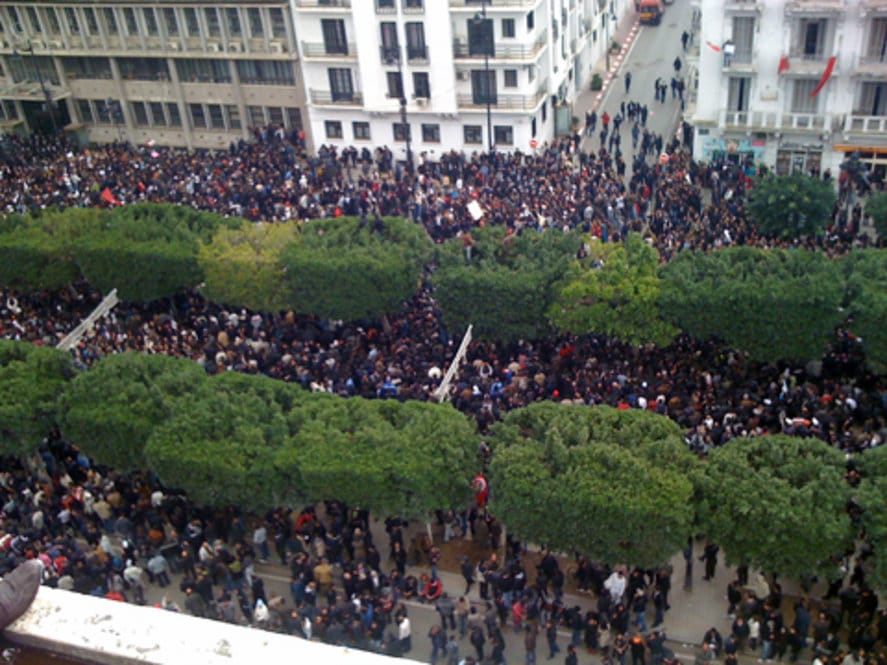
Articles in English
Against the Current
Arab Spring: Against shallow optimism and pessimism. By Atef Said (Issue 187, March-April 2017). Review of Joel Beinin, Workers and Thieves: Labor Movements and Popular Uprisings in Tunisia and Egypt (Stanford University Press, 2015, 176 p.)
“Beinin offers an excellent historical overview of trade unions and workers’ struggle in Egypt and Tunisia, long before the Arab Spring uprisings as well as in their aftermath.”
Campaign for Peace and Democracy
We support the democratic revolution in Tunisia
Statement by the Campaign for Peace and Democracy, January 16, 2011. With links.
Counterfire
The revolt spreads to Egypt. By Joseph Daher (26 January 2011)
“The call for change and revolution from Tunisia has spread to other countries of the region, especially Egypt, where we have witnessed huge demonstrations of 15,000 to 50,000 people, throughout the country against the regime.”
Tunisia: where is the revolution heading? By Joseph Daher (19 January 2011)
“Tunisia’s Jasmine revolution is at a crossroads: will the wind of protest stop with the fall of Ben Ali and the composition of a ‘unity government’ already weakened by the resignation of four ministers? Or will the mobilization continue, leading to a new system of governance?”
The Tunisian Revolution in historical context. By John Rees (19 January 2011)
“All revolutions, said Frederick Engels, start as a ‘revolution of the flowers’ in which an isolated and unpopular regime faces a broad mass movement drawn from every corner and every class of society. The Jasmine revolution, as befits a revolution named after a flower, is no exception.”
CounterPunch
Tunisia: democracy year one. By Serge Halimi (October 7-9, 2011)
“The dictator has gone, so is the Tunisian revolution over? There are more than a hundred, mostly unknown, parties seeking a place in the Constituent Assembly, and anything is possible … There is the excitement of novelty, the hope of establishing an Arab and Muslim democracy.”
Democracy Now!
Tunisia uprising ‘spearheaded by Labor movements, by Internet activists, by rural workers; it’s a populist revolution’. Interview with Juan Cole (January 18, 2011)
“This is the first popular revolution since 1979. It’s a populist revolution, and not particularly dominated in any way by Islamic themes, it seems to be a largely secular development.”
The Guardian
The Tunisia quartet: how an impossible alliance saved the country from collapse. By Chris Stephen (8 December 2015). På dansk (kun uddrag online): Hvordan en umulig alliance reddede Tunesien fra kollaps (Information/Moderne Tider, 2. januar 2016)
“After the optimism of its Arab Spring, Tunisia found itself on the edge of civil war, as protests, strikes and the Islamist agenda of its ruling party split the nation. It took the leadership of four of the country’s most powerful institutions to steer it back from the brink, and earn the Nobel peace prize.”
In Defence of Marxism
Report: Revolution and counter-revolution in Tunisia. By Florian Keller (23 April 2013)
“From the March 26th to 30th the 13th World Social Forum took place in Tunisia. Tens of thousands of activists from hundreds of organisations around the world came together in workshops and meetings on the campus of the university to discuss solutions to the social problems of the world.”
Tunisian Constituent Assembly elections: Ennahda victory prepares further uprisings. By Jorge Martin (7 November 2011)
“The conservative Islamist party Ennahda won a majority of seats (90 out of 217) in the elections to the Constituent Assembly in Tunisia on October 23. This result has sent many on the left into confusion.”
The insurrection in Tunisia and the future of the Arab Revolution. By Alan Woods (15 January 2011)
“The marvellous revolutionary movement of the Tunisian workers and youth is an inspiration and an example to the whole world. For more than one week Tunisia has been living through a revolution of epic dimensions.”
Tunisia: the protests continue (11 January 2011)
“This article, written by the comrades of Marxy.com, gives a full account of the development of the Tunisian uprising, its roots, the hypocrisy of imperialism, and discusses the methods of struggle and the programme needed to take it to a victorious conclusion.”
See also Categories: Tunisia.
Insurgent Notes
On Tunisia (pdf). By Mouvement Communiste (Issue 4, August 2011, 41 p.)
“For revolutionaries, recent events in Tunisia will long remain an important source of reflection. The richness and ambiguity of the popular movements that have shaken this small Mediterranean country and accelerated history in this major world region and beyond deserve close analysis by militants of the workers’ movement.” With a detailed chronology.
International Socialism
Tunisia: the people’s revolution. By Chamseddine Mnasri (Issue 130, Spring 2011)
“In what follows I broach three main factors that, I argue, were decisive in hastening the eruption of the revolution: Unemployment – Corruption – The Internet.”
International Viewpoint
The political lefts in the picture (Issue 501, October 2016)
“In contrast to Egypt, left forces in Tunisia have been able to maintain continuity over several decades, even clandestinely. The main reason for this is the existence, since just after the Second World War, of a powerful trade union movement …”
Nearly five years after the fall of Ben Ali. By Dominique Lerouge (Issue 490, 21 November 2015)
About the situation in Tunisia, workers’ struggles and the political left.
“Normalization” underway in Tunisia. By Dominique Lerouge (Issue 482, March 2015)
“On February 5, 2015 the Tunisian parliament elected on October 26, 2014 gave a vote of confidence to the new government with an overwhelming majority of 81.5%. This major turning point in the political life of Tunisia takes place in a context of economic crisis and social tensions as demonstrations and strikes spread.”
Year four of the revolution – results and prospects. By Fathi Chamkhi (Issue 475, August 2014)
“The revolutionary insurrection which shook Tunisia towards the end of 2010 and the beginning of 2011 allowed the popular classes and youth to drive out Ben Ali and to break his regime. But to get rid of the dictator is one thing. To cut down the economic and social system that sustained him is another.”
Consolidation of the left. By Dominique Lerouge (Issue 456, january 2013)
“Since the spring of 2012, the Tunisian political landscape has been marked by a growing polarization between two major poles.”
Opportunists and the Revolution. By Gilbert Achcar (Issue 444, January 2012)
“In a manner infused with the spirit of Western Orientalism, as defined by Edward Said, some Arabs have held that a despotic mentality has taken root among most of their fellow Arabs as a result of their cultural and educational background.”
An ongoing revolution (Issue 435, April 2011)
“Interview with Jalel Ben Brik Zoghlami, a lawyer and one of the leaders of the Ligue de la Gauche Ouvrière (LGO – Workers’ Left League). He was interviewed by Jan Malewski on February 19, 2011, before the fall of the Ghannouchi government.”
See also Index: Tunisia.
Lenin’s Tomb
Tunisia’s revolution and the Islamists. By Richard Seymour (18 January 2011)
“Repression, combined with a period of sustained economic growth that diminished the social base for the Islamists among the petite bourgeoisie and the rural poor, reduced the weight of them as a serious opposition force so that today it’s tempting to dismiss them. But is the revolution ‘Islamist-free’? Can it be?”
Note on Tunisia’s military. By Richard Seymour (Lenin’s Tomb, January 17, 2011)
“Tunisia’s armed forces are fighting street battles with armed members of Ben Ali’s sinister ‘internal security’ apparatus. Their decision to turn against the dictator was a decisive final blow forcing his resignation.”
Libcom.org
Insurrection in North Africa: the story so far (January 17, 2011)
“We will attempt a brief and preliminary survey of the class aspects of events here; again due to restrictions on information and rapidly developing events this survey is necessarily incomplete.”
Links: International Journal of Socialist Renewal
Tunisia: Activist leader assassinated as left re-unites to provide alternative. By Patrick Harrison and Dominique Lerouge (February 12, 2013)
“Furious protests have exploded onto Tunisia’s streets and a general strike has been called after the assassination of left-wing politician and lawyer Chokri Belaid on February 6. Belaid was head of the far-left Party of Democratic Patriots.”
Middle East Report
Tunisia’s rotten compromise. By Nadia Marzouki (July 10, 2015)
“The narrative of Tunisian success based on compromise should thus be employed with extreme caution. Despite great achievements since 2011, the country is very far from having robust political pluralism or finding political channels for social grievances.”
Tunisia moves to the next stage. By Issandr El Amrani and Ursula Lindsey (November 8, 2011)
“A threshold has been crossed: The transition is now in its second phase, able to concentrate on institutional reform and new government policies to redress socio-economic inequity.”
From people to citizens in Tunisia. By Nadia Marzouki (Issue 259, Summer 2011)
“In Tunisia, site of the deepest-set autocracy, citizens persevered, not only in ousting their leaders but also, as Nadia Marzouki writes, in becoming leaders themselves.”
The reawakening of Nahda in Tunisia. By Graham Usher (April 30, 2011)
“Tunisia has undergone two revolutions in 2011. One overthrew the long-time dictator Zine El Abidine Ben Ali. The second, overshadowed by events in neighboring countries, forced the resignation of two successive ‘interim’ cabinets. One of the political forces that came out stronger from the second revolution is the country’s iconic Islamist movement, Nahda.”
Tunisian Labor leaders reflect upon revolt. By Chris Toensing (Issue 258, Spring 2011)
“The Tunisian revolution of January 2011 drew upon the participation of nearly every social stratum. Organized labor threw its weight into the struggle early on, in an important sign of the breadth and depth of opposition to the rule of the dictator, Zine El Abidine Ben Ali.”
Tunisia’s post-Ben Ali challenge: A primer. By Amy Aisen Kallander (January 26, 2011)
Contents: One-Party Rule – Patrons and Clients – Cyber-Dissent – Islamists and the War on Terror – Aftermath.
Tunisia’s wall has fallen. By Nadia Marzouki (January 19, 2011)
“For the first time in decades, Tunisia is free of one-man rule. The extraordinary events of December 2010 and January 2011 have been nothing less than a political revolution.”
Le Monde Diplomatique
The impossible happened: The Arab wall begins to fall. By Serge Halimi (February 2011)
“Political leaders often claim a situation is so complex that any attempt to change it would be disastrous. This is not always the case. … if there is a social or democratic movement, and new players, the scenario suddenly changes.”
MR Online
Video (+ text): Tunisia, Egypt, and beyond. Interview with Aijaz Ahmad (6 February 2011)
“My sense is that there is a very good chance, a very good chance, that in Tunisia something very progressive, left-of-center, enlightened will arise and it will undo a great many tendencies in the Arab world.”
Socialism Today
Tunisia’s dictator falls. By Chahid Gashir (Issue 145, February 2011)
“Over the course of a month an immensely powerful movement of mass revolt has swept away the dictator-president, Zine El-Abidine Ben Ali. After 23 years he was swept away with lightning speed, testimony to the rage that has accumulated. How far away are the days of Ben Ali’s ‘uncontested’ rule!”
Socialist Project
Tomorrow’s Tunis and Egypt: Reform or Revolution? By Hicham Safieddine (The Bullet, No.457, February 1, 2011)
“Arab uprisings are taking place with the historical speed of light … The Tunisian and Egyptian uprisings are not, as some armchair pundits called the Tunisian one, Jasmine Revolutions. They are ones of bread, bullets, blood, democracy and dignity.” Also at MR Online.
Socialist Review
Workers and the Arab revolutions. By Anne Alexander (Issue 386, December 2013)
“Over the next three months Socialist Review will be exploring the politics and development of these popular revolts. Anne Alexander open this series with an assessment of the nascent workers’ movements in Egypt and Tunisia.”
Tunisia: Revolution in the balance (Socialist Review, Issue 386, December 2013)
“Fathi Chamkhi is a member of the Popular Front coalition, and Mokhtar Ben Hafsa is a school teacher and union activist. They spoke to Jaouhar Tonsy about the struggle for the Tunisian revolution.”
The revolution has only just begun (Issue 356, March 2011)
“With dictator Zine El-Abidine Ben Ali long gone, media attention on Tunisia has waned. But there is now an ongoing battle to cleanse the country of Ben Ali’s cronies, reports Mohamed Tonsi.”
The battle of Tunis. Feature by Anne Alexander, Hela Yousfi, Fathi Chamki & Dominic Kavakeb (Issue 355, February 2011)
“The revolt in Tunisia has sent shivers down the spines of dictators across the region. Anne Alexander looks at the roots of the revolution and considers its broader implications, while Tunisian activists Héla Yousfi and Fathi Chamki give their accounts of the uprising and Dominic Kavakeb examines the role of the internet.”
Socialist Worker (UK)
Tunisia: two years on (Issue 2333, 15 December 2012)
“Siân Ruddick writes on the protests spreading again through Tunisia, while trade union activist Mohamed Sghaeir Saihi describes how workers are organising.”
Tunisia: patterns of revolt (Issue 2236, 29 January 2011)
“Alex Callinicos looks at the nature of the Tunisian uprising and the potential for it to grow into a challenge to capitalism.” With links to other articles about Tunisia.
SocialistWorker.org (US)
Tunisia’s ongoing revolution (March 22, 2011)
“Matt Swagler describes the attempts of Tunisia’s elite to impose order – and the inspiring examples of direct democracy and workers’ struggle since the fall of Ben Ali.”
The revolt spreading across the Arab world (January 27, 2011)
“Kevin Ovenden, a British socialist, spoke to Eric Ruder about the implications of the Tunisian uprising, that has inspired a series of upheavals in the region, panicked regimes across the Middle East and alarmed U.S. policymakers.”
The rise and fall of Ben Ali. By Richard Seymour (SocialistWorker.org, January 18, 2011)
“With Ben Ali overthrown, those ruling class forces that have hitherto feigned an interest in Middle East democracy are worried by the potential consequences.”
A revolution unfolds in Tunisia. By Matt Swagler (SocialistWorker.org, January 17, 2011)
“A mass mobilization that produced protests in almost every corner of Tunisia has swept out one of the most repressive dictators in the Arab world.”
Socialistworld.net
Hands off the UGTT trade union! (24/02/2012)
“For a mass one day general strike, against the attacks on the trade unions and for the full implementation of all the objectives of the revolution!”
Solidarity
Interview with Tunisian socialist (3/191, 2 February 2011)
“An interview with Tunisian postal worker and socialist Nizar Amami, translated from the French New Anticapitalist Party website.”
Tunisia: behind the ‘jasmine revolution’. By Clive Bradley (3/190, 26 January 2011)
“Tunisia’s uprising is the first mass movement toppling an established government in the Middle East and North Africa since the Iranian revolution of 1979. It is the first time ever in history that an Arab dictator has been removed by a popular revolution rather than a coup.”
Weekly Worker
Stirrings of an Arab revolution (Issue 850, January 27, 2011)
“Mass revolts and protests from Tunisia to Egypt once again raise the question of pan-Arab unity, writes Eddie Ford.”
Masses in revolt (Issue 849, January 20, 2011)
The people have succeeded in sending one dictatorial president packing. But the old regime remains intact. James Turley argues for a pan-Arab revolution led by the working class
No to fake new regime (Issue 849, January 20, 2011)
“London-based Tunisian socialist Nadim Mahjoub looks forward to an Arab revolution. Ben Lewis spoke to him.”
World Socialist Web Site
WikiLeaks and Tunisia. By Patrick Martin (19 January 2011)
“WikiLeaks has made public ten cables from the US Embassy in Tunis … The revelations have had a definite political impact in undermining the Ben Ali regime and contributing to the mass demonstrations that ousted the dictator.”
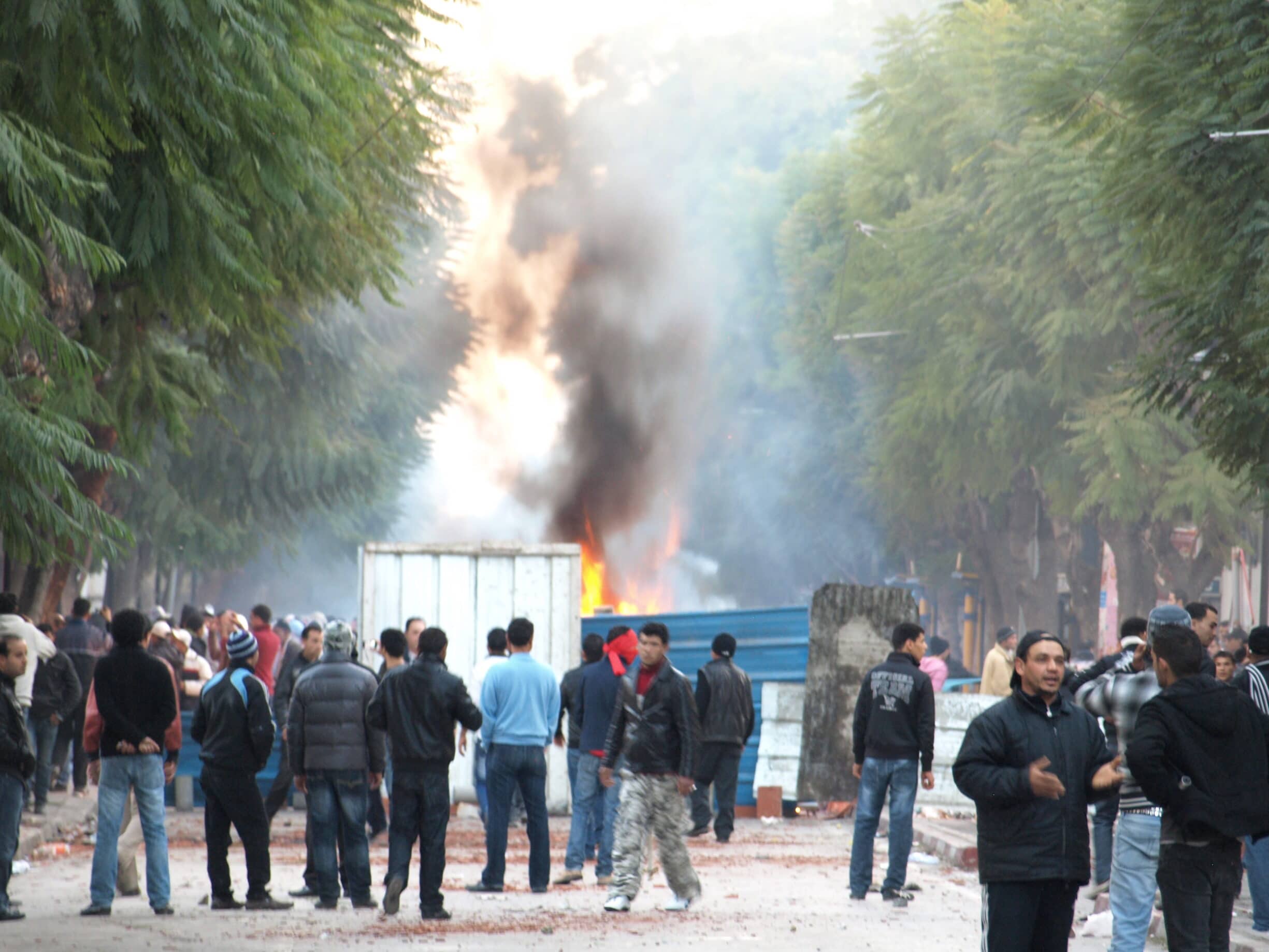
Background
Middle East Report
Authoritarianism and civil society in Tunisia. By Christopher Alexander (Issue 205, October-December 1997)
“Ben Ali’s November 7, 1987 coup inaugurated the heady period of political reform that swept across the Middle East and North Africa in the late 1980s. The new president promised to establish the rule of law, to respect human rights and to implement democratic political reforms. Ten years later, it would be difficult to find another country that has moved so far in the opposite direction.”
Tunisia’s uncertain future. By Fred Halliday (Issue 163, March-April 1990)
“The first months after Habib Bourguiba’s overthrow in November 1987 witnessed an ambiguous honeymoon between the new regime and the Islamists.”
The working-class revolt in Tunisia. By Nigel Disney (Issue 67, May 1978). Only first page online.
“The end of January saw the biggest working-class upheaval since Tunisia won independence in 1956. A general strike called by the half million-strong Union Generale des Traveilleurs Tunisiens (UGTT) was met with violence by the regime.” Only first page online.
